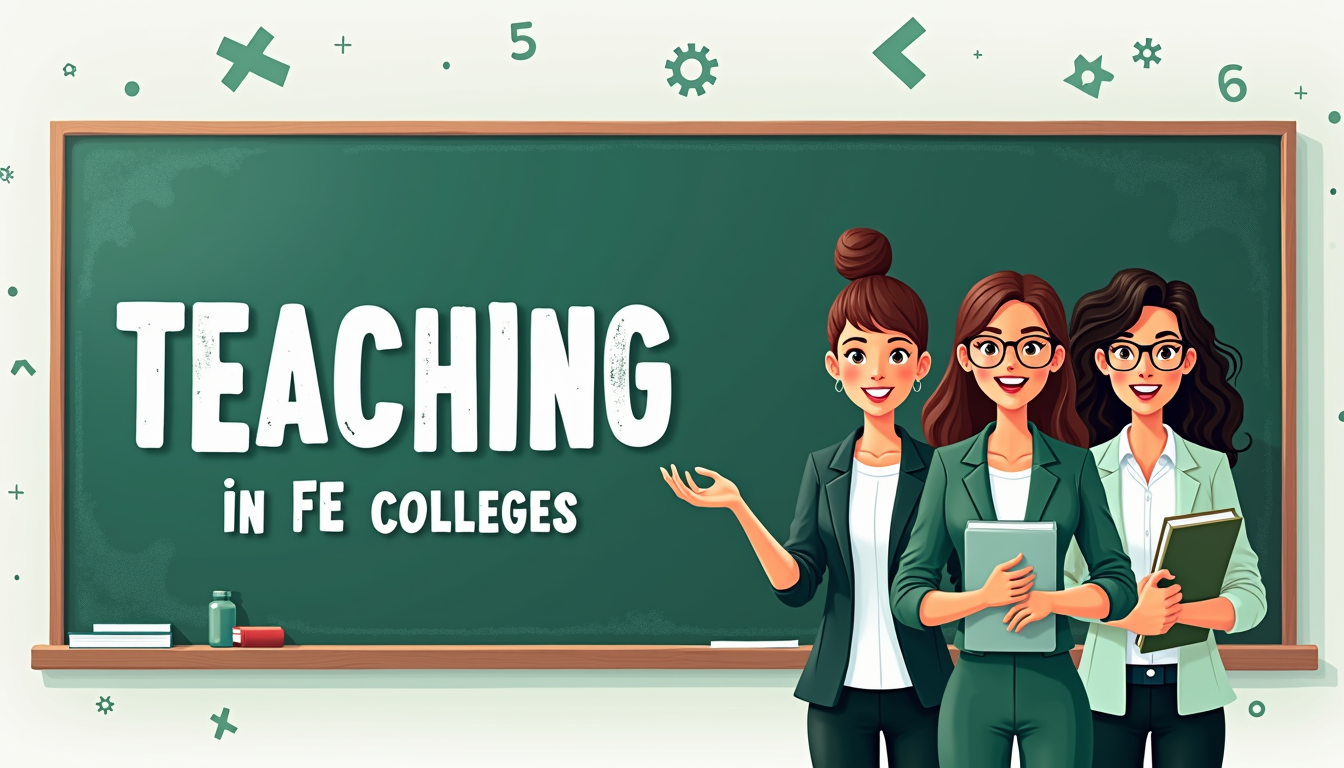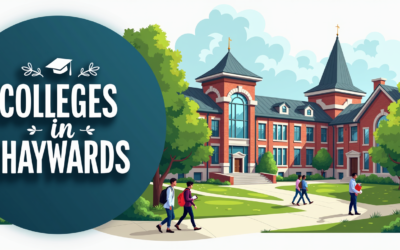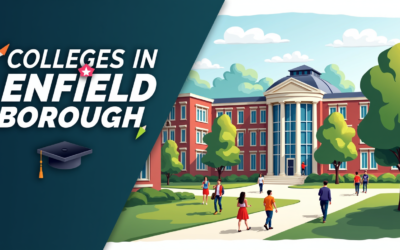Teaching in further education (FE) colleges plays a vital role in shaping futures, offering a gateway to skilled careers and lifelong learning. FE colleges cater to diverse learners—from school leavers pursuing vocational qualifications to adults seeking new opportunities. With an emphasis on practical skills and flexible pathways, these institutions provide incredible value for individuals and communities alike. Whether you’re thinking of becoming an FE teacher or exploring how these colleges impact education, understanding their purpose can help clarify their significance in today’s evolving workforce.
Watch this YouTube video about teaching in FE: Talent to Teach in FE
Understanding Further Education (FE) Colleges
Further Education (FE) colleges are the backbone of the UK’s education system beyond secondary school. They cater to diverse needs, offering practical skills, vocational training, and academic qualifications. Whether you’re an aspiring educator or simply exploring your options, it’s key to understand these institutions and what makes them unique.
The Role of FE Colleges
FE colleges serve a vital role in bridging the gap between school and higher education or direct entry into the workforce. They focus on vocational training, skill development, and lifelong learning, which supports students of all ages. These institutions are not just for teenagers fresh out of school—they also welcome adults seeking career changes, upskilling opportunities, or even a return to education after years in the workforce.
Think of FE colleges as flexible hubs that meet learners where they are. They provide qualifications that are practical and job-focused, such as BTECs, apprenticeships, and NVQs, which are often tailored to fill skills gaps in key industries. For young people, they offer a route into trades like engineering, healthcare, or the creative arts. For adults, they provide evening courses, retraining opportunities, and even programmes for those who want to gain entry into higher education.
So, what makes them essential? FE colleges are accessible and inclusive, catering to different learning needs and schedules. They’re designed to help students transition into the working world with confidence and the qualifications to match. Whether you’re 16 or 60, there’s something for you.
Types of Programmes Offered
FE colleges offer a wide array of programmes, from vocational qualifications to academic certifications. Here’s a breakdown of the most common types of courses:
Academic Courses:
- A Levels: Aimed at 16-18-year-olds as a pathway to university.
- Access to HE Diplomas: Designed for adults who want to enter higher education without traditional qualifications.
Vocational and Technical Courses:
- T Levels: New, hands-on qualifications combining classroom learning with industry placement.
- Apprenticeships: Work-based learning with real-world experience and formal qualifications.
- BTEC/NVQs: Practical, career-focused programmes in fields like health, business, and IT.
Specialist and Skills-Based Training:
- Basic Skills Courses: Focused on improving literacy, numeracy, or IT skills.
- English for Speakers of Other Languages (ESOL): Aimed at non-native English speakers.
- Short Courses: Focused training for specific skills such as coding, photography, or carpentry.
Higher Education Options:
- HNCs and HNDs (Higher National Certificates/Diplomas): Shorter, vocationally centred programmes often leading to a degree.
The beauty of FE colleges lies in their flexibility and variety. Many offer part-time, full-time, and even online programmes, making it easier for students to balance education with work or personal commitments.
With such wide-ranging courses, FE colleges are perfectly placed to provide opportunities that truly match the needs of the modern workforce. Engagement, accessibility, and tailored education are at the heart of what they do.
Pathways to Becoming a Teacher in FE Colleges
Teaching in further education (FE) colleges provides a rewarding opportunity to shape diverse learning journeys. Whether you’re passionate about sharing industry expertise or enjoy cultivating academic growth, these institutions blend practical skills with theoretical knowledge, making careers in FE teaching uniquely fulfilling. Let’s explore the qualifications you’ll need and the routes available to begin your teaching career.
Educational Qualifications Required
To teach in FE colleges, you typically need a combination of subject knowledge and teaching qualifications. These ensure that you can effectively communicate your expertise while meeting the professional standards of the sector. The key qualifications include:
Degree or Equivalent Qualification: If you’re teaching an academic subject, you’ll need a degree in the relevant field, such as Mathematics, Science, or English. For vocational areas, professional qualifications and extensive industry experience can sometimes suffice.
Postgraduate Certificate in Education (PGCE): The most recognised pathway into FE teaching is the PGCE in Post-Compulsory Education and Training (PGCE PCET). This qualification equips you with the teaching skills needed specifically for learners aged 16 and above.
Level 5 Diploma in Education and Training (DET): This diploma is another widely accepted teaching qualification. Often taken while you’re working in the field, it’s ideal for those looking to combine study with hands-on teaching experience.
Initial Teacher Training (ITT): Programmes such as the CertEd (Certificate in Education) or Level 3/4 Award and Certificate in Education and Training are stepping stones for those just starting out or looking for part-time options.
Some FE teaching roles may not require a formal teaching qualification upfront. However, you’re often expected to work towards one, such as a DET or PGCE, within your first year of employment. Having a passion for your subject and a willingness to learn can be just as vital as the qualifications you bring to the table.
Alternative Routes into Teaching
If a traditional qualification-driven route doesn’t suit your circumstances, there are several alternative ways to break into FE teaching:
Direct Application to FE Providers: Many FE colleges hire professionals with industry experience directly into teaching roles, particularly for vocational disciplines like plumbing, engineering, or catering. You could start as an unqualified teacher or trainer and gain teaching credentials while working on the job.
On-the-Job Training Schemes: Institutions like the Teach in Further Education programme offer opportunities to train while you teach. These schemes often combine paid practical experience with part-time study toward a recognised teaching qualification.
Apprenticeships in Teaching: Yes, you can even pursue an apprenticeship to become qualified in teaching within the FE sector. These programmes offer structured work experience alongside training in areas such as instructional techniques and curriculum planning.
Volunteering or Part-Time Roles: If you want to try teaching before committing fully, volunteering or working as a teaching assistant in an FE college can provide invaluable insight. This allows you to develop your skills while contributing to a learning environment.
Industry Specialist Pathways: FE colleges highly value vocational expertise. If you’ve built a career in an industry like IT, business, or healthcare, you can transition into teaching these skills. Some institutions offer mentoring support to help you adapt to educational settings.
Remember, there’s no one-size-fits-all path. Whether you enter FE teaching through formal qualifications, practical experience, or a mix of both, the key is to find a pathway that aligns with your professional strengths and personal flexibility.
Key Skills for Teaching in FE Colleges
Teaching in Further Education (FE) colleges is a rewarding career, but it requires a specific set of skills to truly make an impact. Whether you’re delivering a technical course or guiding learners through academic qualifications, the way you teach plays an essential role in shaping success. Below, we outline the three key skill areas every FE educator needs to focus on.
Pedagogical Skills
As an FE teacher, your teaching methods need to balance both structure and creativity. Effective pedagogy ensures learners not only understand the material but also stay engaged throughout the process. Why does this matter so much? The FE classroom is often a mix of ages, experiences, and ambitions, meaning a one-size-fits-all approach simply won’t work.
- Lesson Planning: Carefully thought-out plans help to set clear goals, provide structure, and establish expectations.
- Differentiation: Adjusting teaching techniques to cater for various learner needs ensures no one is left behind.
- Assessment Strategies: Frequent and constructive feedback ensures progress while boosting confidence.
For example, incorporating practical tasks alongside theory can mimic real-world scenarios, making lessons more relatable and hands-on. It’s like learning to swim; reading about it might help, but diving in teaches you the full experience.
Communication and Interpersonal Skills
In FE colleges, communication isn’t just important – it’s essential. With such a diverse student group, clear and inclusive communication can transform a challenging situation into a shared learning moment. It’s not just about speaking clearly; it’s about listening, too.
- Clarity and Simplicity: Complex topics should be broken down into digestible, step-by-step explanations.
- Active Listening: Being open to students’ ideas and concerns promotes trust and understanding.
- Cultural Sensitivity: Recognising and respecting the diversity within your classroom helps create an inclusive environment.
Think of communication as the bridge between you and your students, helping you navigate their needs, whether it’s challenging questions or a quiet learner who needs encouragement.
Adaptability and Continuous Learning
Education is constantly evolving—new technologies, policies, and methods are changing the way we teach. As an FE teacher, staying flexible and eager to learn keeps your sessions fresh and effective.
- Keeping up with Industry Trends: Vocational courses often align with current job market requirements, meaning you need to stay updated to provide relevant training.
- Professional Development: Participating in workshops, obtaining certifications, and attending events can enhance your teaching abilities.
- Embracing Technology: Tools like interactive whiteboards or learning apps are no longer optional; they’re integral for modern teaching.
Imagine being the sort of teacher who leads by example. If students see you learning and adapting, it inspires them to do the same. Continuous growth isn’t just about keeping up—it’s about staying ahead.
By focusing on these key skills, you not only improve your teaching abilities but also ensure your students achieve their full potential. The result? A thriving, dynamic environment where learning feels meaningful for everyone involved.
Challenges Faced by FE Teachers
Teaching in further education (FE) colleges is as rewarding as it is challenging. While these institutions play a crucial role in delivering practical skills and education to diverse learners, FE educators often juggle significant obstacles. Below, we explore the core challenges FE teachers face and strategies to address them.
Student Engagement and Motivation
Keeping students engaged and motivated requires creativity and persistence, especially when dealing with varied age groups, backgrounds, and life circumstances. Some learners may struggle with confidence, while others might feel disconnected from the material. FE teachers must bridge these barriers to inspire and maintain interest.
Strategies to boost engagement include:
- Interactive Teaching Methods: Incorporate technology such as quizzes, polls, or relevant multimedia to create a lively classroom environment.
- Relating Content to Real Life: Show how lessons connect to career opportunities, current events, or practical scenarios.
- Student-Led Learning: Involve learners in discussions and projects, giving them ownership of their educational journey.
- Regular Feedback: Providing consistent, constructive input helps students track their progress and stay motivated.
Think of engagement as a two-way street. The more effort teachers apply to understand and adapt to their students, the more likely learners are to respond positively. This approach not only builds rapport but also fosters a sense of belonging within the classroom.
Resource Allocation and Funding Issues
Budget cuts and funding limitations have been a persistent challenge for FE colleges. Insufficient resources can lead to outdated materials, understaffed departments, or restricted access to training opportunities for teachers. In turn, this hampers the quality of education offered to students.
Key impacts of funding challenges include:
- Larger class sizes, making individualised attention difficult.
- Limited availability of specialised equipment for vocational courses.
- Reduced professional development opportunities for staff.
Possible solutions involve:
- Exploring Grants and Partnerships: Seeking external funding or partnerships with local businesses can supplement resources and equipment.
- Efficient Utilisation of Technology: Online tools and learning platforms can reduce costs while expanding access to quality education.
- Advocacy for Policy Changes: Joining collective efforts to push for fair allocation of funds helps address systemic underfunding.
FE teachers must often make the most out of limited means. While this requires ingenuity and effort, it also highlights the need for sustainable funding solutions to ensure long-term quality in the sector.
Diversity and Inclusion in the Classroom
One of the most rewarding yet challenging aspects of teaching in FE colleges is the diversity of students. From 16-year-olds transitioning from school to adults returning to education, FE teachers handle classrooms filled with varied ages, cultural backgrounds, and learning needs. Meeting everyone’s expectations isn’t always straightforward.
Common challenges include:
- Language barriers, particularly with ESOL (English for Speakers of Other Languages) students.
- Addressing varied abilities and academic levels within one group.
- Supporting neurodiverse students or those with additional needs.
How educators can promote inclusivity:
- Differentiated Instruction: Tailoring teaching methods to suit individual learning preferences ensures that all students can access the content.
- Fostering an Inclusive Environment: Use activities that celebrate cultural diversity and encourage mutual respect.
- Accessible Materials: Provide resources in various formats (e.g., written, visual) to meet broader needs.
- Collaboration with Support Services: Work closely with college counsellors or inclusion officers to address specific challenges.
An inclusive classroom doesn’t just benefit individual learners – it enriches the entire group. When every student feels valued, it fosters a sense of community and motivates them to engage with their studies.
By addressing these challenges, FE teachers can create a supportive and stimulating environment where learners thrive, despite the hurdles. The effort it takes is significant, but the rewards often outweigh the challenges.
Future Trends in FE Teaching
The world of Further Education (FE) is evolving rapidly, with significant changes reshaping how and what students learn. Teaching methods, priorities, and tools are all undergoing a transformation to better align with the needs of learners and the workforce. Let’s explore two key trends that are setting the direction for FE teaching in the future.
Incorporation of Technology in Teaching
Technology in education has moved far beyond interactive whiteboards and basic online resources. In FE, the integration of advanced tools like Artificial Intelligence (AI) and immersive technologies is taking centre stage. These innovations are not just trends; they are becoming staples of the modern classroom.
AI, for example, offers personalised learning experiences that adapt to a student’s progress. If one learner struggles with a specific topic, AI-powered platforms such as adaptive quizzes or automated tutoring can step in to provide targeted support. This kind of tailored education is a game-changer—not just for boosting understanding but also for building student confidence.
Beyond AI, online and blended learning platforms are reshaping traditional teaching models. Virtual reality (VR) and augmented reality (AR) are being used to simulate real-world environments. Students studying engineering, for instance, can “enter” a virtual workshop where they practise using machinery without the need for physical setups. This isn’t just engaging; it bridges the gap between theory and practice.
Why is this significant? Because technology makes education more engaging, accessible, and inclusive. Consider students in remote areas who might struggle to attend on-campus lessons—online platforms bring courses to their fingertips. Similarly, those with additional needs benefit from accessible features, such as speech-to-text tools or multimodal learning options.
In the coming years, expect an even greater focus on tech-enabled teaching. Institutions are investing in robust IT infrastructure, educators are undergoing digital training, and students are benefiting from a more connected learning experience.
Focus on Skills-Based Education
As industries continue to evolve, FE colleges are placing a growing emphasis on preparing students for real-world jobs. There’s a clear shift from traditional rote learning to a more hands-on, skills-based approach. Why? Because employers value practical expertise over theoretical knowledge.
Take the rise of apprenticeships and T-Levels—qualifications that blend classroom education with industry placements. These programmes allow learners to apply what they’ve learned in actual work environments, gaining the confidence and competence they need for employment. It’s not just about education anymore; it’s about empowerment.
Moreover, FE teachers are increasingly focusing on industry-relevant skills during lessons. For example, a hospitality course might involve not just classroom discussions about customer service but actual role-playing scenarios that simulate interactions in a restaurant or hotel. This method ensures students graduate with both knowledge and experience under their belts.
Here’s the reality: theoretical knowledge alone no longer holds the same weight. Employers want graduates who can hit the ground running. That’s why colleges are forging partnerships with local businesses to ensure their curricula meet current industry needs. Whether it’s digital marketing, green energy, or health sciences, skills-based education is paving the way for a future-ready workforce.
FE colleges are becoming hubs of innovation, blending academic knowledge with technical skills to ensure students are fully prepared to lead in their chosen sectors. This shift isn’t just a trend—it’s a transformation that aligns education with the demands of a fast-evolving job market.
Conclusion
The landscape of teaching in further education (FE) colleges is rich and complex. It provides unique opportunities for both educators and learners, participating in a dynamic process of education that adapts to societal and individual needs. Each day in FE colleges is a chance to inspire, engage, and empower a diverse range of students, making it a fulfilling endeavour.
Highlighting the Importance of FE Colleges
FE colleges not only bridge the gap between traditional education and the workforce but also serve as a foundation for lifelong learning. They empower students to pursue vocational skills while fostering personal growth. By championing inclusivity and accessibility, these colleges ensure that everyone has the chance to reach their potential.
Emphasising Practical Approaches
The focus on practical skills and hands-on learning is vital. In today’s fast-moving job market, employers prioritise candidates with applicable experience. FE colleges respond to this demand, offering courses that equip students with the competencies they need to thrive.
Looking Ahead
The future of FE teaching appears promising. With ongoing advancements in technology and a sustained emphasis on skills-based learning, educators have the tools at their disposal to enhance teaching methods and student outcomes. This adaptability ensures that FE colleges remain relevant and impactful in their mission to educate.
Commitment to Growth
As the landscape evolves, so should educators’ commitment to their own professional development. Upskilling and embracing new teaching methods not only benefit instructors but also enrich students’ learning experiences. The educative journey is collaborative—empowering educators and students alike.
By addressing current challenges, harnessing innovative trends, and maintaining a dedication to quality education, FE colleges will continue to play a fundamental role in shaping the future workforce and enriching communities.




